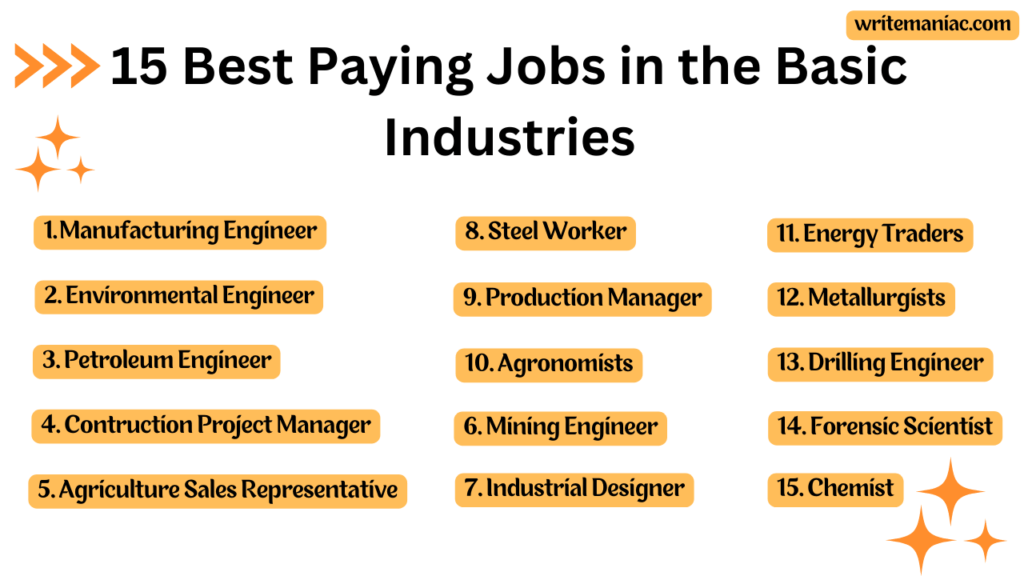
The youth of today have to face this difficult choice of choosing a good career. Often, they are confused about which career path will work out for them. This is mostly because the number of choices that are available nowadays is also a lot—which makes it more difficult to choose.
As you are here, you are probably wondering—is basic industries a good career path? Well, in this article I’m going to discuss this. I’ll also include some of the great job options in the basic industries as well which pay a very reasonable amount—keep on reading to learn about those job options.
But before we get started in detail, let me first mention that Basic industries can be a great career path if you are looking for stability and job security.
Jobs in the basic industries are always in demand no matter what the economy is actually doing. Most jobs in the basic industries come with good benefits—so it’s a good career choice for most of the youth looking for jobs.
It’s safe to say that the basic industry will survive for the upcoming few decades easily because it’s a major industry.
Also, the demand for raw materials is never-ending. This is exactly why the jobs in the basic industries will stick for a long time no doubt. These kinds of jobs will always be needed.
This article will cover everything you need to learn before choosing basic industries as a career. I will also list some of the best-paying jobs in this field. So, let’s dive in!
What Are Basic Industries?
Basic industries are those that produce raw materials or intermediate goods. These goods are then used in other industries as raw materials.
Basic industries form the foundation of a country’s economy. It is often called the primary industry.
Having a good basic industry is very important for a country’s economic success. This industry also contributes to the global economy. This industry is vast and diverse.
Many kinds of companies, from small to giant-sized companies are involved in the basic industries. So the job opportunities in this industry are huge.
The Types of Basic Industries
Agriculture:
Agriculture is the production of crops. It is a basic industry because it produces raw materials that are used in the production of food.
It also contributes to the production of clothing and fuel. This basic industry is very important for our global economy because it plays a significant role.
According to USDA(United States Department of Agriculture)—in 2020, 19.7 million full- and part-time jobs were related to the agricultural and food sectors—10.3 percent of total U.S. employment.
Product examples:
- Crops such as wheat, corn, rice, and soybeans
- Livestock such as cattle, pigs, and chickens
- Milk products
- Fishes
Mining Industry:
Extraction of minerals and other natural resources from the earth is done within the mining basic industry. Minerals are very important for many major industries. So, the mining industry can’t be left behind.
The mining industry involves the exploration and development of mines. The extraction and processing of minerals are also a part of the industry.
This can include the extraction of metals such as copper, gold, and iron. Non-metallic minerals such as coal, oil, and natural gas are also extracted.
There is a good number of jobs available in this industry.
According to Ibisworld—there are 108,391 Mining businesses in the US as of 2022, an increase of 0.9% from 2021.
Product examples:
- Metals such as copper, gold, iron, etc
- Coal
- Non-metallic minerals
- Industrial minerals
Oil and Gas Industry:
Extraction and refinement of oil and gas are generally done in this industry.
The oil and gas industry plays a significant role in the global economy. The materials produced in this industry are essential for transportation, industrial processes, and the generation of electricity.
However, the oil and gas industry also has a significant impact on the environment. Because the extraction and use of fossil fuels contribute to air pollution. It also affects greenhouse gas emissions.

Product examples:
- Gasoline
- Diesel
- Jet fuel
- Heating oil
Steel Industry:
The steel industry is a basic industry that produces steel. Steel is an essential material that is used worldwide.
The steel industry involves the extraction of iron ore from the earth. Then it is refined and used to produce steel. This industry plays an important role in the global economy.
Product examples:
- Structural steel
- Reinforcing steel
- Steel beams
- Steel pipes
Energy Industry:
The energy industry involves the production of energy like electricity and natural gas. Energy is essential for the functioning of all other industries. It is also an important part of the daily lives of people.
Energy is essential for the production of goods and services. Other industries can’t function without this industry. So, it’s very important.
Product examples:
- Electricity
- Natural gas
- Renewable energy
- Biofuels
Construction Industry:

The construction of homes, office buildings, and other structures is part of this industry. This industry is very important for a country’s growth.
Residential construction, commercial construction, and infrastructure construction are all part of this basic industry. There are many jobs available in this industry as well.
According to Statista—the U.S. construction sector was at around 1.6 trillion U.S. dollars in market value in 2021.
Product examples:
- Buildings and bridges
- Roads
- Airports
- Dams and tunnels
Is Basic Industries a Good Career Path?
As I mentioned earlier, basic industries can be a good career path for individuals who are interested in working in industries that produce raw materials or intermediate goods.
Working in a basic industry can provide individuals with the opportunity to work in a variety of roles, including engineering, management, and technical positions.
These industries often offer competitive salaries and benefits packages, as well as opportunities for advancement.
However, you should know that working in a basic industry can also be physically demanding and may involve working in challenging environments, such as mines or offshore oil rigs.
But then again you can’t really expect good rewards if there is no challenge, right?
Salary and Education Requirements for the Basic Industries
The salary and education requirements for careers in basic industries can vary depending on the specific industry and the role in question. In general, however, these industries often require workers to have some level of education or specialized training in order to qualify for certain positions.
I’ll mention the salaries in the jobs section.
How Many Jobs Are Available in the Basic Industries
There are many jobs available in the basic industries because it is one of the major industries. It is also called the primary industry for a good reason.
According to the World Bank, the agriculture industry employs around 1.3 billion people globally, while the mining industry employs about 7.5 million people globally, and the construction industry employs approximately 7.5 million people globally.
Also, according to USBLS(US Bureau of Labor Statistics), jobs available in Basic Industries are 24,504,000 as of 2022. It is also anticipated to raise by 2.7% in the next 8 years.
Why Choose a Career in the Basic Industries
There are a number of reasons why an individual might choose a career in basic industry. I’ll mention some of the reasons below:
- Job stability: Basic industries are typically characterized by long-term stability, as they are involved in the production of essential goods and services that are needed by society. This can provide individuals with job security and the ability to build a long-term career in a particular industry.
- Competitive salaries: Many basic industries offer competitive salaries and benefits packages, which can make them an attractive career choice for individuals who are looking to earn a good income.
- Opportunities for advancement: Many basic industries offer opportunities for advancement and career progression, which can allow individuals to take on more responsibility and move up the career ladder.
- Opportunities to make a difference: Working in a basic industry can provide individuals with the opportunity to make a meaningful contribution to society and to play a role in the production of essential goods and services.
15 of the Best Paying Jobs in the Basic Industries

I’ve gathered 15 examples of basic industry jobs with salaries, along with some information about the job duties and education requirements to judge if it’s a suitable career path for you or not:
1. Manufacturing Engineer:
Annual wage is $80,000 – $100,000 per year. Manufacturing engineers design and oversee the production of goods and may be responsible for the maintenance and repair of equipment.
A bachelor’s degree in engineering or a related field is typically required for this role.
2. Environmental Engineer:
Annual wage is around $50,000 – $80,000 per year. Environmental engineers design and oversee the implementation of systems to protect the environment, such as water treatment plants and waste management systems.
A bachelor’s degree in environmental engineering or a related field is typically required for this role.
3. Petroleum Engineer:
This job has an annual wage of $130,000 – $150,000. The median salary is about $137,000.
Petroleum engineers design and implement processes for the extraction and production of oil and natural gas.
This can involve conducting geologic and engineering studies, designing drilling and well-completion equipment and overseeing the drilling and production of oil and gas wells.
In order to become a petroleum engineer, individuals typically need to have a bachelor’s degree in petroleum engineering or a related field. Some employers may prefer to hire individuals who have a master’s degree in petroleum engineering or a related field.
4. Construction Project Manager:
The annual wage is around $80,000 – $100,000 per year. Construction project managers oversee the planning and execution of construction projects and are responsible for budgeting, scheduling, and safety.
A bachelor’s degree in construction management or a related field is typically required for this role.
5. Agriculture Sales Representative:
One can earn about $50,000 – $80,000 per year with this job. Agriculture sales representatives sell agricultural products and services to farmers and other customers.
A bachelor’s degree in agriculture or a related field is typically required for this role.
6. Mining Engineer:
Annual wage can be around $50,000 – $80,000 per year. Mining engineers design and oversee the operations of mines and may be responsible for safety, production, and budgeting.
Research says mining engineers’ employment will increase by 2 percent from 2021 to 2031. So, it is slow-growing employment but can be rewarding.
A bachelor’s degree in mining engineering or a related field is needed to land a job in this field.
7. Industrial Designer:
The minimum wage for this kind of job is around $50,000 – $80,000 per year. Industrial designers create designs for products, such as machinery, tools, and consumer goods.
If you are creative and you like to create designs then this job should be on your priority list as well.
A bachelor’s degree in industrial design or a related field is typically required for this role.
8. Steel Worker:
The median salary for steel workers is around $50,000 per year but this can vary depending on the location, employer, and level of experience.
Steelworkers are responsible for the production of steel. Sometimes steelworkers may be eligible for benefits such as health insurance, retirement plans, and paid time off.
Steelworkers may work in a variety of settings, including steel mills, foundries, and fabrication shops.
In order to become a steelworker, individuals typically need to have a high school diploma or equivalent and may also need to complete a vocational training program or apprenticeship.
Some employers may prefer to hire individuals who have a bachelor’s degree in engineering or a related field.
9. Production Manager:
The median salary for production managers is around $100,000 per year. Production managers are responsible for the planning and coordination of the production of goods and services.
Production managers may work in factories, manufacturing plants, and warehouses. Production managers typically work full-time.
The job can be stressful and may involve managing tight deadlines and working under pressure. However, if you love this kind of work then this can be a fun experience to try as well.
In order to become a production manager, individuals typically need to have a bachelor’s degree in business administration, engineering, or a related field. Sometimes master’s degree is also required.
10. Agronomists:

Agronomists can earn around $70,000 per year. Agronomists are responsible for a wide range of tasks, including conducting research on plant growth and development, developing new crop varieties, and advising farmers on best practices for crop production.
Agronomists typically work full-time. The job can be physically demanding and may involve working outdoors in a variety of weather conditions. But if you have a passion for working on crops then this job should be on your priority list.
A bachelor’s degree in agronomy or a related field, such as plant science or agricultural engineering is required for this job.
11. Energy Traders:
The salary for an energy trader is around $80,000 per year but it can reach up to $200,000. Energy traders buy and sell energy products, such as oil and natural gas, on behalf of companies or individuals.
Energy traders analyze market trends and determine the best times to buy and sell energy products in order to maximize profits.
Individuals typically need to have a bachelor’s degree in business, economics, or a related field to land a job.
12. Metallurgists:
The minimum wage for this job is around $70,000 per year. Metallurgists are scientists who specialize in the study of metals and the methods used to extract and process them.
Metallurgists are responsible for conducting research on the properties of metals and alloys, developing new methods for extracting and processing metals, and advising on the best practices for metal production.
A bachelor’s degree in metallurgy or a related field, such as materials science or chemical engineering is required for an individual to land a job in this category.
13. Drilling Engineer:
The median salary for drilling engineers is around $100,000 per year, but this can vary. Drilling engineers are responsible for the design and oversight of the drilling of oil and gas wells.
They basically conduct geologic and engineering studies, design drilling and well-completion equipment, and oversee the drilling and production of oil and gas wells.
To become a drilling engineer you need to have a bachelor’s degree in engineering or a related field.
14. Forensic Scientist:
Forensic scientists can earn around $60,000 or more per year. Forensic scientists are scientists who use scientific techniques to analyze physical evidence in order to solve crimes.
Forensic scientists analyze physical evidence, such as fingerprints, DNA, and other biological materials. They use this evidence to identify suspects and establish links to crimes.
Forensic scientists typically crime labs, forensic science labs, and government agencies.
A bachelor’s degree in natural science, such as biology, chemistry, or forensic science is the prerequisite for becoming a forensic scientist.
15. Chemist:

Around $75,000 per year is a chemist’s median income. Chemists study the properties and behavior of matter, including the structure and composition of substances, the reactions they undergo, and how they can be transformed.
Chemists are responsible for conducting experiments. Then they analyze the data of the experiments to develop new products or technologies.
Individuals typically need to have a bachelor’s degree in chemistry or a related field to become a chemist.
In Conclusion
To summarize today’s topic— is basic industries a good career path, let’s go through what we’ve learned so far.
A career in the basic industries can be rewarding and offer competitive salaries and benefits. However, it is important to keep in mind that the work in these industries can be physically demanding and may involve working in challenging environments.
But you need to carefully research the specific requirements and expectations of the job before deciding to pursue a career in the basic industries.
There is no doubt that the basic industries provide a wide range of job opportunities for individuals with diverse skill sets and education levels.
But before making a final decision you must consider your interests, skills, and career goals. You should also set a goal from an early age to land a job that is perfect for you.
If you are interested in earning without skills you should read this article!
Finally, we can say that the basic industry can be a good choice because it provides a good earning potential with a stable career option. Thank you for reading!
You might be interested to read:
Is Computer Software Prepackaged Software a Good Career Path?



![Is Homework Illegal? [Reasons Why Homework Should Be Banned] 9 is homework illegal](https://writemaniac.com/wp-content/uploads/2023/01/is-homework-illegal-1024x576.png)
![What Is a Conferred Degree? [Easily Explained in 2023] 10 what is a conferred degree](https://writemaniac.com/wp-content/uploads/2023/01/what-is-a-conferred-degree-1024x576.png)
